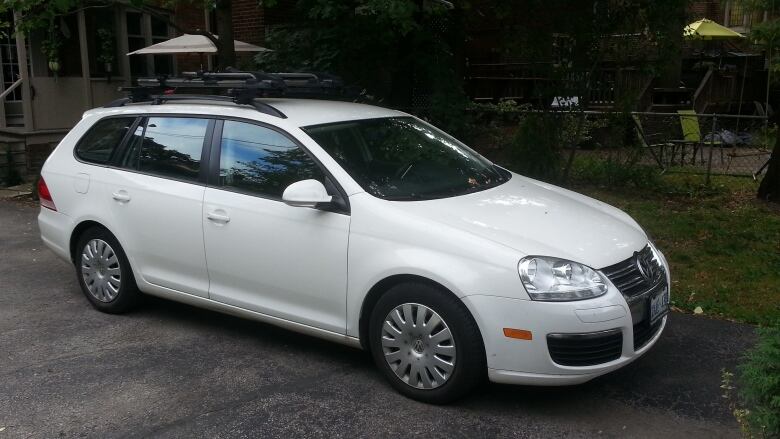VW's personal betrayal a sad lesson in business morality: Don Pittis
Volkswagen reminds us why profit-motivated companies need tight regulation

The first car I ever bought was a Volkswagen. A person who picked me up hitchhiking offered it to me for$200, and I drove it proudlyfor years. I drive a Volkswagen now. But suddenly the fun's gone out of it.
When I look back, I realize that until this week, I must have beena Volkswagen person. And the news that the German automakerdeliberately cheated on environmental standards feels like a personal betrayal.
- Volkswagen CEO in firing line as company's board meets to decide on his future
- Volkswagen CEO Martin Winterkorn"endlessly sorry" for emissions scandal
- Volkswagen Canada halts some sales as emissions rigging scandal deepens
- Volkswagen case echossimilar scandals at GM, Toyota, Honda
Perhaps even worse, it makesme despair about corporate morality in general. Acompany I have always thought of as being among the mostresponsible corporate citizensappears to have intentionallycheated not only public environmental lawsbut all the other car companies that thought they were working from a common set of rules. It cheated me.
I've drivenlots of other carsover the years, including areliable little Fordthat took me back and forth from Oxford to London when I lived in England. But when I look back, Volkswagens have been a big part of my life.
My first bug
One of my earliest automobilememories was of a VWBeetle, or a bug, as we called it,parked behind the big grey sedan with rounded fenders that sat in our Torontodriveway. As I was growing up, my familydrove a succession of Volkswagen station wagons, although I remember the last one being in the garage a lot. The new-fangled electronic fuel injectiontookthe blame.
The car I bought as a teenager, also a bug, cost me next to nothing to fix. It was the old pre-electronic kind and with the aid of a book called A Manual for the Compleat IdiotI repaired the carburetor, tuned the fuel mixturewith a screw driver, replaced the muffler and windshieldand kept the little beast running through my first years of university.
Volkswagenwent through a bad patch after that. A friend who drove a Passat warned usnot to go near them. But when our Suzuki wagon died, we began looking for a fuel-efficient, environmentallyfriendly car that would suit our needs.
We're not green fanatics. After all, we still drive. But we do believe in reducing our environmental footprint. We are also willing to spend a little extra to encourage carmakers who go the extra kilometre to develop green technology.
Despite our friends' warning, we decided VW had learned its lesson on customer satisfactionand so splashedout on a brand new 2009 TDI wagon. And for the first sixyears we've driven it contentedly.
It's been reliable. There is little sign of rust. The engine is powerful and quiet.On long trips to Thunder Bay, Saskatchewan and Quebec, the car has been a fuel sipper, usingbetween four and five litres per 100kilometres.
Driving a lie
"It's 'clean diesel,'German engineering," I would boast."Not the old smoky kind."
And all the while, it wasn't true.
What an embarrassment. Now I feel like I should puta bag over my head when I get back behind the wheel.
I've always thought of Volkswagen as a company different from others. It pays its workers well, encouraging union membership. It spends big money onresearch and development, with a stream of innovations, including its XL1 hybrid that uses a single litre of fuel per 100 kilometres.
Thisoutrageous environmental cheat, created specifically and intentionally to game the machine that tests for emissions, cannot bethe work of a rogue engineer. The court investigation will reveal more, but it sounds like a corporate strategy to purposely setaside legality,morality and integrity in favour of profit.
Volkswagen is a very rich and powerful company that could have done things differently. It reminds you of the wealthy politician or business person who accepts bribes or puts their fingers in the till just to get a little bit richer. In many ways it is hard to understand.
VW has undermined its own reputation. Presumably, like those politicians and business people, the company assumed it would never be caught.ButVolkswagen has provided us with a useful reminder of the forces driving companies of all sorts, and the dangers of deregulation.
It is a reminder of the huge pressure companies are under to keep their profits growing. It tells us that sometimes, even companies that depend on their good name will lie and cheatto increase the bottom line. Especially when they know their share price will bounce back in a few years once people have forgotten the scandal.
It says that all the glossy advertising filled with promises may wellbe no more than a sucker play and without governments and universities and non-business watchdogs on the lookout for cheats, sometimes, even the most respectable businesses are willing to take you for a ride.
Follow Don on Twitter @don_pittis
More analysisby Don Pittis












_(720p).jpg)


 OFFICIAL HD MUSIC VIDEO.jpg)
.jpg)



























































































